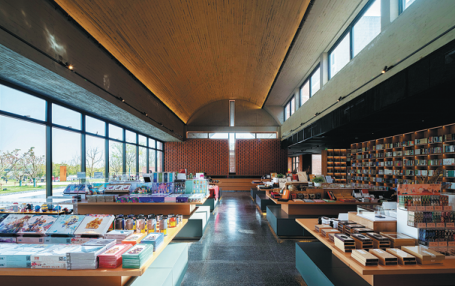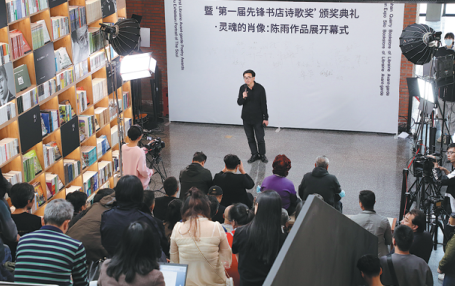Hillside verses
Librairie Avant-Garde's largest branch opens in Nanjing, with events paying homage to poetry, Yang Yang reports.

In April, a bunch of poets gathered at the new branch of Librairie Avant-Garde, Tangshan Hill Pit Bookshop, for the first poetry award initiated by the store.
Built on the ruins of a mine at the foot of the hill, about 4 kilometers from the nearest Wenquan (hot spring) village, in a suburb of Nanjing, Jiangsu province, it is the bookstore chain's 18th branch and largest, covering 1,300 square meters.
It is also the first village bookshop to open in Nanjing since Qian Xiaohua founded Librairie Avant-Garde 25 years ago.
The branch offers a collection of nearly 20,000 books, among which more than 1,000 are on poetry. Works from home and abroad, such as by Chinese poets Haizi and Beidao, Syria's Adonis, India's Rabindranath Tagore and Portugal's Fernando Pessoa, can be seen on the shelves at the entrance of the bookshop.
On two walls are more than 5,000 books of other genres, including works by foreign writers, such as William Shakespeare, Albert Camus, Fyodor Dostoevsky, Italo Calvino and Margaret Atwood, and Chinese writers like Mo Yan, Yu Hua, Su Tong and Eileen Chang.
There are also 3,000 children's books, including award-winning picture books. Like other branches, the Nanjing bookshop also offers 2,000 books on local culture and nature, including the Tangshan Hill, minerals and rocks, and architecture and hot springs.
When Qian went to the deserted mine to choose the location for his new bookshop, he was immediately attracted by two dilapidated redbrick kilns.
Abandoned for years, the outside of the kilns was covered by green vines and wild grass in stark contrast with the bricks' color, which was conspicuous in the ruins.
The area inside the kilns seemed narrow to him, but when he looked up the wall stretched steeply upward to a small open space at the top, it gave him hope, he says.
Qian says the site represents the fusion of nature, history and industry. In its plain look is a perseverance to move forward and reach for the future, which fits the spirit of rebuilding in the ruins, he says.
The architect Yang Zhijiang kept the original two redbrick kilns that are more than 20 meters tall, and built a new building, which leans on the hill.
Yang divided the building into three spaces, trying to keep its historical sense while also presenting a refreshing experience for visitors.
"It's Librairie Avant-Garde's first bookshop built on an industrial ruin, which gives the shop a historical temperature, representing an avant-garde spirit," Yang said at the opening ceremony on April 17.
"We hope this bookshop will create more opportunities for people to communicate with each other, slow down and think, and promote cultural exchanges," Qian says.
Apart from space for books and reading, the branch has independent exhibition and screen spaces. Its first exhibition, The Portraits of Souls: Works by Chen Yu, is now on at the new store.
"A good space interacts positively with excellent works and will appear different for audiences. When you go to see the works on your own, the effect will be different from that when you see the works together with many other people," says Hui Wenshu, curator of the exhibition.
Hui says the space in the bookshop inspired the organization of works.
The opening ceremony was also an event to pay homage to poetry by hosting the first Avant-Garde poetry awards.
The award for translation went to Liu Xiangyang, who has translated works by US poets, such as Jack Gilbert, Louise Gluck and Gary Snyder.
"Liu's translation has not only conveyed the poets' temperament and grace, but also showed the professionalism of a translator," according to the award's jury.
"He has spent over 10 years translating Gluck's poems, trying to represent the poet's subtle narrative aesthetics, which sometimes is swanking passion, and sometimes reserved prayer. He shows the true feelings in details and sublimates their meaning into the infinite," the comment says.
The Avant-Garde young poet award went to Li Suo, who published her first poetry collection, A Pearl Ship on Wednesday, in 2019.Li is "a poet who is growing increasingly important" and "one of the most remarkable female poets in China", according to the award's jury.
"Li Suo is explicitly drawing the outline of her poetry world, with pure breaths and a bright and warm heart. Her poems are full of desire to grow and the tension of life. Such a poet as Li is worth more expectation," the comment says.
Han Dong won the main Avant-Garde poetry award, for "his unassuming metaphysical imagination that gives his diction a certain kind of transcendence. He endows plainness a spirit.... His language is highly recognizable among works in Chinese language, and thus the language gains a new space in his writing," the award's jury says.
"In our time, what we need the most is great poetry, which is a free spirit, a living weapon and a shelter for souls. And poets are the brightest stars in the universe and the greatest walkers on Earth," Qian says.
"We hope that through our unremitting efforts, our humble and honest guard, we will provide poetry a blue sky."



Today's Top News
- Wang to meet foreign ministers of Cambodia, Thailand in Yunnan
- China's top legislature concludes standing committee session
- Thailand and Cambodia agree to temporary ceasefire
- NPC's 4th annual session slated for early March
- Civilizational links for a fairer world
- Manufacturing in China spurs global growth






























